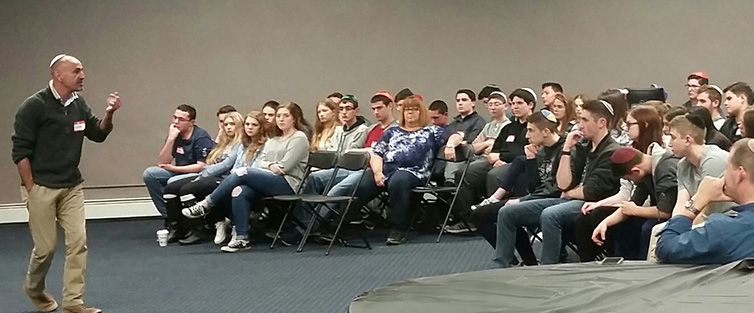Internationally-recognized educator Dr. Raviv helps Jewish Rockland forge new path
By Jennifer Gilbart, FedConnect Editor
If your kids are turned off at religious school, it’s an “unbelievable blessing.”
“There are no bad students, just bad teachers.”
The danger isn’t the Jews who disagree. It’s the ones who no longer join the discussion.
When Dr. Zohar Raviv spoke to a full house of 450 attendees at New City Jewish Center on March 7, he wanted to present a fresh way of looking at Judaism and to push audience members “beyond their zone of comfort.” It’s something Raviv succeeded in doing three weeks prior, when he met with a group of leaders from Rockland’s Jewish agencies and synagogues at a “community weaving” seminar in Israel.
Rabbi Dov Oliver, Director of Hillel of Rockland, attended the community weaving seminar in Israel and was “blown away” when he heard Raviv there. “I immediately thought that our community back home should hear his point of view for themselves. The synagogue and agency leaders in Israel agreed and with significant logistical and other support from Federation, we made Raviv’s trip to Rockland possible.”
Zohar Raviv – Vice President of Taglit-Birthright and “one of the most influential educators in the world” – spent just a little over 24 hours in Rockland in early March. During that time he met with nine different groups, addressing nearly 800 people including public school educators, teens from Rockland synagogues, adult education students, Jewish community board members, and others. But the high point of his visit was his talk that was open to the public on Tuesday evening, March 7.
Keeping the Jewish experience relevant to the next generation was the focus of Raviv’s discussion. As he said to the packed room, “We’re losing this generation, who wants nothing to do with our religion. This means you raised your kids well and they don’t want a mediocre Jewish education.” Raviv challenged Jewish educators to keep teens engaged by focusing on the “why,” not the “how.” “We need to ask why be Jewish. Currently we teach kids how to be Jewish, how to follow our rituals, which is why they lose their attachment. Judaism is myopic, the way we give it to the next generation. It should be a perpetual question, not a perpetual answer.”
Another way in which the next generation is “turned off” to Judaism is through what Raviv calls our “rhetoric of crisis.” According to Raviv, the language of crisis and urgency is the “Jewish narrative” and the way in which many Jewish people communicate because “it’s embedded in us.” Added Raviv, “We amplify crises, such as issues of Israel hate and anti-Semitism. But what we need to remember is that we are Jews despite the bad, despite the Holocaust. Not because of the Holocaust.”
Keeping the younger generation engaged in Judaism is undoubtedly the key to keeping our Jewish future strong and vibrant. Raviv discussed ways that Taglit-Birthright achieves engagement, and many audience members asked questions about Birthright’s concepts and tactics. But the discussion points on which Raviv ended the evening were focused on Rockland. “One of the most impressive things I’ve seen is Rockland’s ability to come together and even sit together in this room. This is not to be taken for granted.” Raviv’s last words of inspiration for the evening were a directive to move forward, together. “As a community, you must have courage to plant seeds of fruits you won’t live to see. Take this leap of faith.”


0Comments
Add CommentPlease login to leave a comment